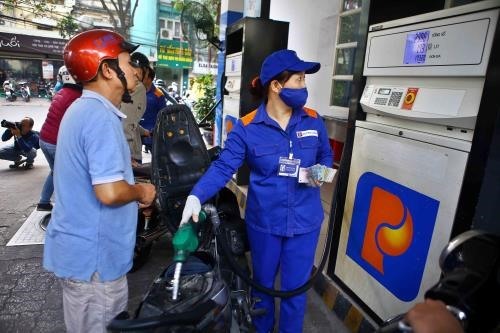 Economy
Economy

The Government is considering withdrawing a proposal from the Ministry of Finance (MoF) to increase environmental taxes on fuel products to the maximum of VNĐ8,000 (US$0.35), stating the move requires further consideration.
 |
| Each litre of petrol cost an extra VNĐ1,000 due to the hike of environmental tax. — Photo xangdau.net |
HÀ NÔI — The Government is considering withdrawing a proposal from the Ministry of Finance (MoF) to increase environmental taxes on fuel products to the maximum of VNĐ8,000 (US$0.35), stating the move requires further consideration.
The ministry has proposed several times almost tripling the environmental protection tax on oil and gas consumption to the maximum VNĐ8,000 per litre, including in the draft revised Law on Environmental Protection Tax.
The environmental protection tax on petroleum products was last increased on January 1, 2019, according to a resolution issued by the National Assembly Standing Committee on October 20, 2018.
Under the resolution, the tax on gasoline was increased by VNĐ1,000 to VNĐ4,000 per litre instead of VNĐ8,000 per litre as proposed by the MoF.
Kerosene was subject to an environmental tax of VNĐ1,000 per litre, VNĐ700 higher than the current level.
In addition, taxes on lubricants and mazut was also raised to VNĐ2,000 per litre from the previous level of VNĐ900.
The bio-fuel E5 RON 92 is selling at VNĐ16,272 per litre, while that of RON 95-III is VNĐ17,603 per litre. Each of petrol litre was added VNĐ1,000 due to the hike of environmental tax.
The Government has submitted a report to the National Assembly on law making this year and next, including the draft revised Law on Environmental Protection Tax which has only focused on petrol.
The Government said it would need more time to study the draft, especially the issue of expanding taxable subjects with adverse impacts on the environment.
The resolution proposed increasing environmental tax on gasoline, kerosene, diesel, mazut, aviation fuel and plastic bags to the highest level. Some products such as coal, herbicides, pesticides, forest preservatives and warehouse disinfectants were not raised to the maximum tax level.
The drastic change would affect businesses’ production and competitiveness, prompting the Government to call for more time to consider the decree.
The MoF’s proposal raised concerns from experts and citizens. Many experts pointed out that raising environmental protection tax not only goes against stimulus measures but also creates inequality for low and middle income people and reduces domestic consumption.
Đặng Thị Thu Hoài, Secretary of the Prime Minister’s Economic Advisory Group warned the increase could affect businesses’ production costs and competitiveness.
She also said all people need petrol, including the poor, so the tax hike could affect income distribution.
Developed countries which have better social welfare systems have the conditions to apply such taxes, and while Viet Nam can learn from such nations, the country must live in reality, she added.
Nguyễn Thị Tuệ Anh, deputy director of the Central Institute for Economic Management said tax is only one tool to encourage green growth and sustainable development and other policies should be considered, such as green credit. — VNS




